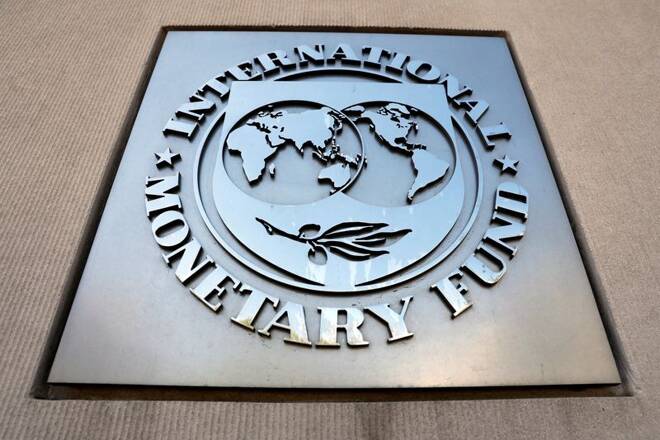Advertisement
Advertisement
IMF cuts global growth forecast due to “seismic waves” from Russia’s war in Ukraine
By:
By Andrea Shalal WASHINGTON (Reuters) - The International Monetary Fund on Tuesday slashed its forecast for global economic growth by nearly a full percentage point, citing Russia's war in Ukraine, and warning that inflation was now a "clear and present danger" for many countries.
By Andrea Shalal
WASHINGTON (Reuters) -The International Monetary Fund on Tuesday slashed its forecast for global economic growth by nearly a full percentage point, citing Russia’s war in Ukraine, and warning that inflation was now a “clear and present danger” for many countries.
The war is expected to further increase inflation, the IMF said in its latest World Economic Outlook, warning that a further tightening of Western sanctions on Russia to target energy exports would cause another major drop in global output.
The IMF said other risks to the outlook include a sharper-than-expected deceleration in China prompted by a flare-up of COVID-19 lockdowns.
Rising prices for food, energy and other goods could trigger social unrest, particularly in vulnerable developing countries, the IMF said.
Downgrading its forecasts for the second time this year, the the global crisis lender said it now projects global growth of 3.6% in both 2022 and 2023, a drop of 0.8 and 0.2 percentage point, respectively, from its January forecast due to the war’s direct impacts on Russia and Ukraine and global spillovers.
Medium-term global growth is expected to decline to about 3.3% over the medium-term, compared to an average of 4.1% in the period from 2004 to 2013, and growth of 6.1% in 2021.
“What has Russia’s invasion of Ukraine cost? A crisis on top of a crisis, with devastating human costs and a massive setback for the global economy,” IMF Managing Director Kristalina told a food security panel on Tuesday.
War impacts
The IMF has estimated that Ukraine’s GDP will collapse by 35% this year, while Russia’s output will shrink by 8.5% in 2022, while emerging and developing Europe, including both countries, will contract by 2.9%.
But IMF Chief economist Pierre-Olivier Gourinchas told a news briefing that a tightening of sanctions against Russia to include restrictions on energy exports could double Russia’s GDP decline to 17% by 2023.
The European Union, highly dependent on Russian energy, saw its 2022 growth forecast cut by 1.1 percentage points, while Britain now faces slower economic growth and more persistent inflation than any other major economy next year.
Spillovers from higher energy prices, a loss of confidence and financial market turmoil from this step would cut another two percentage points off of global growth forecasts, Gourinchas said.
The war, which Russia describes as a “special military operation” has caused a humanitarian crisis in Eastern Europe, displacing some 5 million Ukrainians to neighboring countries, the IMF said.
The war has exacerbated inflation that already had been rising in many countries due to imbalances in supply and demand linked to the pandemic, with the latest lockdowns in China likely to cause new bottlenecks in global supply chains.
Gourinchas said central banks face increased pressure to fight inflation with tighter monetary policy, and a further tightening of sanctions could accelerate this move, which could cause more difficulties for developing economies.
“The war adds to the series of supply shocks that have struck the global economy in recent years. Like seismic waves, its effects will propagate far and wide — through commodity markets, trade, and financial linkages,” Gourinchas said.
Reduced supplies of oil, gas and metals produced by Russia, and wheat and corn – produced by both Russia and Ukraine – had driven up prices sharply in Europe, the Caucasus and Central Asia, the Middle East and North Africa, and sub-Saharan Africa, but was hurting lower-income households around the world.
The IMF said it had revised downward its medium-term outlook for all groups, except commodity exporters who benefit from the surge in energy and food prices.
‘CLEAR AND PRESENT DANGER’
The IMF said inflation was now projected to remain higher for longer, driven by war-induced commodity price increases and broadening price pressures, and it warned the situation could get worse if supply-demand imbalances deepened.
For 2022, it forecast inflation of 5.7% in advanced economies and 8.7% in emerging market and developing economies, a jump of 1.8 and 2.8 percentage points from January’s forecast.
“Inflation has become a clear and present danger for many countries,” Gourinchas said.
He said the U.S. Federal Reserve and many other central banks had already moved toward tightening monetary policy, but war-related disruptions were amplifying those pressures.
The IMF said there was a rising risk that inflation expectations become de-anchored, prompting a more aggressive tightening response, which could put pressure on a wider range of emerging market economies.
Financial conditions tightened for emerging markets and developing countries immediately after the invasion and the repricing has been “mostly orderly,” but further tightening was possible, as well as capital outflows.
The war had also increased the risk of a more permanent fragmentation of the world economy into geopolitical blocks with distinct technology standards, cross-border payment systems, and reserve currencies, a move Gourinchas said would be a “disaster”
(Reporting by Andrea Shalal and David Lawder; Editing by Andrea Ricci and Chizu Nomiyama)
About the Author
Reuterscontributor
Reuters, the news and media division of Thomson Reuters, is the world’s largest international multimedia news provider reaching more than one billion people every day. Reuters provides trusted business, financial, national, and international news to professionals via Thomson Reuters desktops, the world's media organizations, and directly to consumers at Reuters.com and via Reuters TV. Learn more about Thomson Reuters products:
Advertisement
